

Battle of the Reusable Bottles: Plastic vs. Aluminum vs. Stainless Steel. It’s no secret we advocate for the use of reusable bottles.
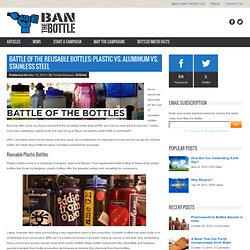
But how often have you found yourself at the reusable bottle aisle at REI and had no idea what to choose? I mean, how many sleepless nights must one lose trying to figure out exactly what bottle to purchase!? Well, I probably have not lost sleep over this issue, but nonetheless it’s important to once-and-for-all lay the rest the myths and facts about different types of bottles available for purchase. Reusable Plastic Bottles Plastic bottles come in a multitude of shapes, sizes and flavors. Lately, however, the news surrounding a key ingredient used in the production of plastic bottles has seen quite a bit of backlash from consumers. Should you be concerned about BPA in plastic bottles? Do the Plastic Numbers Make a Difference?
Plastic, Stainless Steel, Aluminum or Glass Water Bottle? With the mounting body of evidence and growing awareness surrounding the bottled water scam, you have consciously made the decision to “Drop” the purchase of those plastic water bottles.
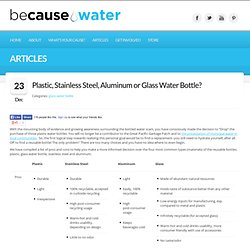
You will no longer be a contributor to the Great Pacific Garbage Patch and to the privatization of municipal water in local communities. So, the first logical step towards realizing this personal goal would be to find a replacement–you still need to hydrate yourself, after all. Off to find a reusable bottle! The only problem? There are too many choices and you have no idea where to even begin.
Don't Buy A Nalgene Water Bottle Until You Read This. Choosing a Safe Reusable Water Bottle. (Before It's News) Reusable water bottles!
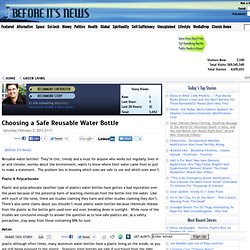
They’re chic, trendy and a must for anyone who works out regularly, lives in an arid climate, worries about the environment, wants to know where their water came from or just to make a statement. The problem lies in knowing which ones are safe to use and which ones aren’t. 101_Drinking_Water_Manual.pdf. Is Water the Next Critical Smart Grid? Oracle survey indicates the adoption of smart water meter technologies is key to conservation.
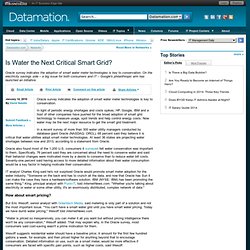
In light of periodic energy shortages and costs spikes, HP, Google, IBM and a host of other companies have pushed for the broad adoption of smart grid technology to measure usage, spot trends and help control energy costs. Now water may be the next major resource to get the smart grid treatment. In a recent survey of more than 300 water utility managers conducted by database giant Oracle (NASDAQ: ORCL), 68 percent said they believe it is critical that water utilities adopt smart meter technologies. At least 36 states are projecting water shortages between now and 2013, according to a statement from Oracle. Oracle also found most of the 1,200 U.S. consumers it surveyed felt water conservation was important to them. IT analyst Charles King said he's not surprised Oracle would promote smart meter adoption for the water industry.
How about smart pricing? Aging water infrastructure burdens U.S. economy, report finds. Peak oil and peak water explained [part two] World Oceans Day 2014: World's Most Polluted Seas Revealed. According to WWF, more than 80% of marine pollution is caused by land-based activities.Getty Images Sunday 8 June is World Oceans Day, an event to raise global awareness about threats to the oceans and promote marine conservation.
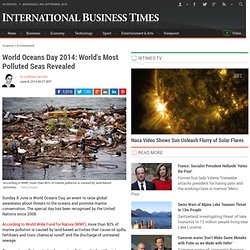
The special day has been recognised by the United Nations since 2008. According to World Wide Fund for Nature (WWF), more than 80% of marine pollution is caused by land-based activities that cause oil spills, fertilisers and toxic chemical runoff and the discharge of untreated sewage. Some water pollution starts also as air pollution, which settles into waterways and oceans, according to the United States' National Ocean Service.
IBTimes UK looks at the most polluted oceans areas and seas in the world. Atlantic Ocean - Gulf of Mexico Dead Zone The Gulf of Mexico is a basin in the Atlantic Ocean, surrounded by the gulf coast of the United States, Mexico and Cuba. The dead zone here is one of the largest in the world. Hypoxia kills fish in huge numbers. Too many people still lack basic drinking water and sanitation – UN report. 8 May 2014 – Despite a narrowing disparity in access to cleaner water and better sanitation between rural and urban areas, sharp inequalities still persist around the world, says a new United Nations report.

According to the 2014 Joint Monitoring Report on global progress against the Millennium Development Goal (MDG) on water and sanitation, more than half of the global population lives in cities, and urban areas are still better supplied with improved water and sanitation than rural ones. But this gap is decreasing. Plastic Pollution in Oceans. Environmental Issues > Oceans Main Page > All Oceans Documents The Basics We're treating the oceans like a trash bin: around 80 percent of marine litter originates on land, and most of that is plastic.
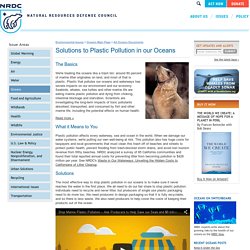
Plastic that pollutes our oceans and waterways has severe impacts on our environment and our economy. Seabirds, whales, sea turtles and other marine life are eating marine plastic pollution and dying from choking, intestinal blockage and starvation. Scientists are investigating the long-term impacts of toxic pollutants absorbed, transported, and consumed by fish and other marine life, including the potential effects on human health. Read more » Of All The Water in the World, Just 0.08% Makes It To Our Faucets (Infographic) The world is covered in oceans, rivers and lakes, but when we look at how much actually makes it to our faucets, it only amounts to around 0.08%.
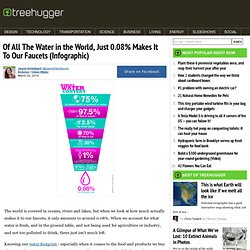
When we account for what water is fresh, and in the ground table, and not being used for agriculture or industry, and not too polluted to drink, there just isn't much left. Knowing our water footprint - especially when it comes to the food and products we buy - has never been more important. Water Wars 2: Privatization - Stuff They Don't Want You To Know.